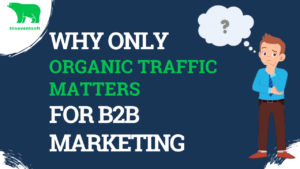Understanding the Relationship between SEO & Social Media
Gone are the days when marketers considered either Search Engine Optimization (SEO) or social media marketing and not both for their marketing strategies. It is an age that has blended both of them. Marketing is undergoing a fascinating transformation after 2020 since organizations, mostly B2B, are focusing on growth using organic channels.
Search has always been a significant source of traffic and leads for firms that use online marketing. However, social media marketing has become much more popular with the rise of focus on organic marketing. But one could wonder which is more crucial- Getting SEO done or focusing on social media?
Let us take the example of a smartphone purchase. If you are a buyer, you would typically not restrict yourself to just one site to make a purchase decision. You would visit Youtube for reviews, Instagram for checking updates, Facebook for real-life comments, etc. Now every brand is under pressure to ensure that the content on their website is good enough and ranks higher, but they are also maintaining a presence across all the channels.
Hence, the above case is the premise for the importance of integrating SEO with social media.
A social media SEO plan may help your company develop stronger customer relationships, improve your content to rank better in SERPs results and on social media, and better reach your target audience where they spend the most time.
SEO and Social Media Integration
Google's policy wrt social media
Although Google once considered social media interaction as one of the ranking factors in its search algorithm, it has now removed it from its policies. It is no longer considered a direct ranking factor. But, in the actual case, social media plays a critical role in engaging the web pages. According to Neil Patel, a 2018 study by Hootsuite compared SEO outcomes for articles with and without social media marketing. The pieces with the most social shares had a 22 percent rise in SEO results. Patel also notes an Optinmonster analysis that backs up Hootsuite’s findings.
Even Bing admits that social media influence is one factor that affects search page results. Even if it’s not a clearly stated element, we believe it’s safe to argue that social media participation impacts search. Because Google has repeatedly changed its mind regarding algorithm parameters over the years, we may expect it to pivot on social signals in the future as well.
Quality is what matters to Google. The goal of Google’s algorithm, according to the company, is to provide “the most useful and relevant information.” Because users are engaging with the material and sharing it with others, social signals indicate that – users find a website valuable and relevant. Strong social cues, in this sense, are associated with solid content that may also do well in search engines.
Reason social media needs to be integrated with SEO
You might have a general question in your mind. When Google clearly states that it doesn’t consider social media presence a ranking factor, why bother? The answer is Quality.
Let us understand the reasons below why the integration of social media with SEO is essential.
- A high-quality website that engages users will undoubtedly have a high level of social media interaction. Both social media and SEO can benefit from high-quality content.
- Users that interact with your website and share it on social media expose it to additional people. Pageviews, time spent on a page, pages viewed on your website, bounce rate, and other potential search algorithm criteria may rise.
- The more people connect with your brand and share it with their followers on social media sites like Facebook, Instagram, etc., the more likely you will gain trust and authority in your industry. This can help you improve the relevancy of your search results for users.
- The life of high-quality material users interact with on social media is extended. A single post can be shared for years, making it an effective lead generation tool for your company.
- The more brand awareness you can generate through social media, the more probable it is that people will connect to your website from their high-quality site. Backlinks of high Quality can assist you in climbing through the ranks.
Naturally, high-quality content will reach more people as they share it with others and link back to it, including on social media. If the your content content becomes viral on social media channels, there is a guarantee it will rank better in search engines.
7 Steps to integrate Social media with SEO

Include social media sharing buttons on your website
Although it may appear straightforward, search engines such as Google are beginning to leverage data from social network sharing to influence search ranks. As a marketer, having social media sharing buttons on your blog and website is vital for encouraging users to share material on social media. These buttons will assist in generating social media traffic. They will also play a significant role in search engine ranking positions today and in the future.
Make SEO keyword research as a part of social media
As I have stated, the distinction between search engines and social media platforms is becoming increasingly blurred. Take your website’s keyword strategy and apply it to your social media involvement when it’s appropriate. This does not imply stuffing keywords into tweets. Instead, pay attention to how you phrase your social media messages. You may boost the reach of your messaging by integrating keywords into social media material.
Add links to your social media profiles.
No-follow links are commonly used in social media messaging, such as tweets and Facebook status updates. This means they don’t provide the site they’re linking to any SEO authority. While this is beginning to change, it’s vital to remember that the URL in a social network account’s actual bio is a follow link. Keep this in mind, and make sure you’re using these extra resources.
Add hyperlinks to video and presentation content.
Content-sharing services, such as YouTube for video and SlideShare for presentations, are among the most powerful social media platforms. Include links to similar blog posts or other information on your website when sharing content on these platforms. Yes, this will enhance website visitors, but it will also aid in developing new incoming connections. Because it is the “simple” thing to do, when someone writes a blog post about your content, they are likely to include a link from the presentation.
Improve your social media profiles
Consider your social media profile pages to be extra pages on your website. Audit your social media profiles to ensure they mirror your website’s search engine optimization strategy. Similarly, you would optimize website pages for page titles and keywords.
Increase your social media reach and build links
Inbound links to your website have long focused on search engine optimization. While inbound links are still crucial, social media reach should be considered a secondary statistic for businesses to enhance search traffic. Social media data is increasingly becoming a factor in search engine rankings. You need to raise the number of fans or followers on your account to encourage more people to share your material on social media. You will increase your social media reach and your inbound links if you do this through excellent content creation and participation.
Develop new connections to maximize outreach
The internet has evolved into a social media platform. Relationships, like sales, are critical for generating inbound links and attracting social media attention. Using social media to create relationships can lead to opportunities for guest blog posts and other link-building options.
Achieving organic traffic through social media
Google has recently integrated a new feature that provides answers to its user’s queries through results like featured snippets, without any need to click on any webpage link. This feature is said to have decreased the incoming traffic by 15%.
Listening to Social media conversations is one solution to it. What is the significance of this? We witness a rise in relevant search phrases, volume, and the number of results shown when a particular topics or certain circumstance based hashtags (related to events such as Olympics or US presidential elections) becomes popular on social media. You can take advantage of the current search intentions by addressing those issues on your website—for example, through a blog post
To get insights, we propose employing social listening technologies. Several programs are available to show you what social users are discussing online. You can use these tools to keep track of your brand mentions in social media conversations and talk on your own social media channels. You may also use social listening tools to monitor what’s trending across platforms among social media users.
Optimizing content for social media
Social media can be a solid link-building strategy; when social media users link to your material on their websites. It all starts with high-quality content on your website. You wish to do the following:
- Make content that people want to click on, interact with, and share. The importance of conducting thorough research cannot be overstated. You must understand your target audience, which will vary depending on the social site.
- Stick to SEO standard practices. This involves having metadata, optimizing the material for high MSV keywords, and concentrating on user-friendly content.
- Provide your target leads and customers with interesting, relevant information. Instead of selling to clients, focus on giving helpful material.
- Create eye-catching or dynamic social graphics from your content.
- The final stage isn’t to write a caption. Concentrate on generating social visuals that summarize the content in a way that sticks out in users’ news feeds to capture their attention.
Conclusion
Combining the two techniques will increase the number of opportunities for people to discover your brand. However, it may indirectly enhance your search results page rankings.
When your website receives much traffic, search engines that scour the internet will notice and consider your brand respectable. They may then prioritize your search result above others. As a result, if you share intriguing information on social media that is highly clickable, you may experience an increase in visitors.
Furthermore, your page authority may increase if consumers or trusted companies read your social media posts and share your website’s link on their blogs or websites. This is something that could help you climb the ranks.
While social media marketing may not significantly impact your rankings or total page authority score, it can’t harm you, especially if you’re just getting started.





